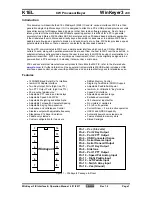
CHAPTER 18 Core Entities
Mediant 4000 SBC | User's Manual
Parameter
Description
■
[0]
Disable
= (Default) Media Anchoring is
employed, whereby the media stream traverses
the device (and each leg uses a different coder or
coder parameters).
■
[1]
Enable
= No Media Anchoring. Media stream
flows directly between endpoints (i.e., does not
traverse the device - no Media Anchoring).
■
[2]
Enable when Same NAT
= No Media
Anchoring. Media stream flows directly between
endpoints if they are located behind the same
NAT.
For more information on direct media, see
.
Note:
■
If the parameter is enabled for direct media and
the two endpoints belong to the same SIP
Interface, calls cannot be established if the
following scenario exists:
✔
One of the endpoints is defined as a foreign
user (for example, “follow me service”)
✔
and one endpoint is located on the WAN and
the other on the LAN.
The reason for the above is that in direct media,
the device does not interfere in the SIP signaling
such as manipulation of IP addresses, which is
necessary for calls between LAN and WAN.
■
To enable direct media for all calls, use the global
parameter SBCDirectMedia. If enabled, even if
the SIP Interface is disabled for direct media,
direct media is employed for calls belonging to the
SIP Interface.
■
If you enable direct media for the SIP Interface,
make sure that your Media Realm provides
sufficient ports, as media may traverse the device
for mid-call services (e.g., call transfer).
Security
'TLS Context Name'
tls-context-name
[SIPInterface_TLSContext]
Assigns a TLS Context (SSL/TLS certificate) to the
SIP Interface.
The default TLS Context ("default" at Index 0) is
assigned to the SIP Interface by default.
Note:
■
For incoming calls: The assigned TLS Context is
used if no TLS Context is configured for the Proxy
Set associated with the call or classification to an
IP Group based on Proxy Set fails.
■
For outgoing calls: The assigned TLS Context is
used if no TLS Context is configured for the Proxy
Set associated with the call.
- 343 -
Summary of Contents for Mediant 4000 SBC
Page 1: ...User s Manual AudioCodes Series of Session Border Controllers SBC Mediant 4000 SBC Version 7 2...
Page 40: ...Part I Getting Started with Initial Connectivity...
Page 48: ...Part II Management Tools...
Page 113: ...Part III General System Settings...
Page 118: ...Part IV General VoIP Configuration...
Page 525: ...Part V Session Border Controller Application...
Page 654: ...Part VI Cloud Resilience Package...
Page 663: ...Part VII High Availability System...
Page 685: ...Part VIII Maintenance...
Page 759: ...Part IX Status Performance Monitoring and Reporting...
Page 844: ...Part X Diagnostics...
Page 888: ...Part XI Appendix...
















































